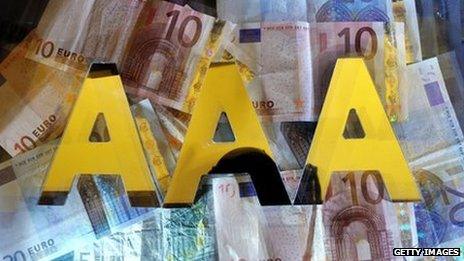Do credit rating agencies threaten our financial stability?
- Published

For decades, the credit rating agencies and their downgrades were rarely heard of outside of financial markets, but now barely a week goes by without their mention in the news headlines - and this week the Commons Treasury Select Committee begins an investigation into their activity.
So what do credit rating agencies actually do and how far reaching is their influence?
Basically, they rate bonds - government or corporate IOU's - to provide an assessment of the likelihood of default.
These decisions and ratings are hugely important. The higher the rating, the less risky a borrower is perceived to be - so the lower the rate of interest which has to be paid.
The leading agencies - Standard & Poor's (S&P), Moody's and Fitch - have been given official status by regulators.
Banks and insurance companies have to hold highly-rated bonds in their reserves, and pension funds and other investors are often required to sell bonds which have been downgraded by the ratings agencies.
The debate on credit rating agencies took a dramatic twist in January when the Italian financial police - the Guardia di Finanza - carried out a dawn raid on the Milan office of S&P.
They took away documents and files as part of a wide ranging and ongoing investigation into alleged market manipulation.
The raids followed S&P downgrading the Italian sovereign rating last autumn - a move which seemed likely to push up the Italian government's borrowing costs.
That fuelled anger about the agencies.
In response to the allegations, S&P spokesman Martin Winn says: "We don't believe that these proceedings have any merit and we are defending against them very vigorously."
'Out of control'
But this is not the first time the agencies have come in for criticism.
In the US, the credit rating agencies' reputation was severely dented by the sub-prime housing boom and bust.
Banks had shovelled money towards people who could ill-afford to buy their own homes. Mortgages were parcelled up and sold on to investors as complex financial products.
These products needed ratings and the agencies were happy to oblige - and were duly paid by the banks creating these securities.
David Levy was a senior managing director at Moody's until he left in 2004 - he says agencies had to dance to the tune of the banks if they wanted business.
Speaking to Radio 4'sFile on 4programme, he said: "The investment bank putting together the bond could easily go to the various agencies and say 'how would you rate this pool?' They could just do it in preliminary way."
"If they didn't like the results they got, they [the banks] could just go with another agency that was willing to give them a higher rating."
Another former Moody's insider is William J Harrington - he was a senior analyst from the 1990s until he resigned in 2010.
He criticises the rating of complex instruments, based on mortgages, known as CDO's.
"By 2006 I thought the rating process for CDO's had broken down so badly that I really didn't want anything else to do with them.
"I think after that the process was out of control because there was so much underwriting, and really the impetus was just to get deals out the door and bill for them."
A Moody's spokesman told the BBC: "The importance Moody's places on the quality, transparency and integrity of our ratings process underpins everything we do.
"We recognise that all business models have the potential for conflicts of interest regardless of whether an issuer, investor or government pays for the rating.
"Moody's has strong protections in place to manage these potential conflicts, including separation of the commercial and analytical aspects of our business."
Investigating the agencies
As defaults increased, the sub-prime bubble burst. Staff of the US regulator - the Securities and Exchange Commission - investigated Moody's, S&P and Fitch in 2008.

Alistair Darling says the threat of a ratings downgrade helped him negotiate with Gordon Brown
They seized more than 2 million emails and instant messages - one said "they could be structured by cows and we would rate it."
The agencies argue that the analysis of mortgage securities should have been better - but they point out that others failed to foresee the housing crash.
More recently S&P removed the coveted Triple-A rating from the United States itself. The timing, in August last year, coincided with a round of market jitters over the eurozone.
The US Treasury Secretary Timothy Geithner claimed S&P had made a $2 trillion mistake in its sums.
John Chambers is the head of sovereign rating at S&P. He says after discussion with the US Treasury, they changed some of their calculations - but there was no error.
Mr Chambers told the BBC he has received threats in the post, but would not elaborate further.
Five months after the US downgrade, it was France's turn as S&P removed its Triple-A rating.
The European Commission, aware of this political mood, has embarked on more than one reform programme, but recently it has rowed back from its most radical ideas.
It proposed a ban on sovereign ratings of countries in financial trouble - but that got shelved. The financial markets commissioner Michel Barnier told the BBC:
"We have proposed to ensure that those ratings happen in a much more regular way - every six months rather than every 12 months.
"There will be an obligation to inform the government involved 24 hours before the publication of the report, which allows for certain changes if there are issues which are incorrect."
It is worth pointing out that after the downgrades of the US and France, their borrowing costs actually fell - suggesting that there are many factors other than ratings which dictate the interest rates a government has to pay.
Recently the UK was put on "negative outlook" by Moody's, meaning a possible loss of the Triple-A rating within 18 months - but it is not the first time the UK has faced such a warning.
Back in 2009 Alistair Darling, then Chancellor, had to contend with a threat of a possible downgrade from Standard and Poor's - it came at a sensitive time just a year before the general election but, Mr Darling said, it helped him in his personal battle with the then Prime Minister Gordon Brown to agree a plan to cut borrowing:
"It is well documented at the time there was something of an argument going on in the government. Actually the [threat of a] downgrading helped me enormously, because that strengthened my hand in saying 'look we have to have a credible plan'. So I looked at this with mixed emotions, I think."
However, this week Andrew Tyrie MP, chairman of the Commons Treasury Select Committee, said the agencies had been "systemically wrong" with their analysis before the banking crisis and there was a need to assess what regulation should be in place.
The agencies will have a chance to respond to the committee when it reconvenes later this week to examine the work of the agencies - but critics say they have a lot of explaining to do.
Listen to the full report onFile on 4onBBC Radio 4on Tuesday, 28th February at 20:00 GMT and Sunday, 4th March at 17:00 GMT. Listen again via theRadio 4 websiteor download thepodcast.